China Insight
“It’ll Only Get Better” – The Week of Hong Kong National Security Law on Weibo
“Horses will still run, stocks will still sizzle, and dancers will still dance.”
Published
5 years agoon

WHAT’S ON WEIBO ARCHIVE | PREMIUM CONTENT ARTICLE
The implementation of the Hong Kong National Security Law has been a hot topic in international media over the past week. On Chinese social media, the law and the global responses to it have also triggered widespread discussions.
The new National Security Law (NSL) that came into effect on June 30 has caused alarm in Hong Kong, where people have protested for greater freedom, democracy, and independence from the political influences of Beijing since March of last year.
Although the law has been described as a “nightmare” by some critics, there are Beijing supporters who claim it is “huge progress.”
Pro-regime author Thomas Hon Wing Polin, for example, called the implementation of the law “the most hopeful day in the life of Hong Kong since its return to China in 1997.”
The law’s full name is the “Safeguarding National Security Law of the Hong Kong Special Administrative Region of the People’s Republic of China” (中华人民共和国香港特别行政区维护国家安全法), and it basically stands for everything Hong Kong demonstrators have protested against for so long – less autonomy and more Beijing influence over the city.
On July 8, the national security office was officially opened in Hong Kong.
About the National Security Law
The NSL provides legal guarantee for police to “safeguard China’s national interest” and apply the law, that imposes criminal penalties for secession, subversion against state power, terrorist activities, and collusion with foreign forces.
The NSL has many vague provisions, and the legislative interpretation is up to Beijing. This makes it easier for Chinese authorities to punish protesters and those who criticize the government. People convicted of national security crimes could face up to life imprisonment.
The law (see full text here) has garnered special attention for its Article 38 and Article 43, the latter of which took effect on July 7.
Article 38 mainly triggered controversy for stating that every provision of the NSL also applies to everyone outside of Hong Kong:
“This Law shall apply to offenses under this Law committed against the Hong Kong Special Administrative Region from outside the Region by a person who is not a permanent resident of the Region.”
Oh my god am I reading this right???
Article 38: The law applies to persons who do NOT have permanent resident status in HK and commit crimes under this law OUTSIDE Hong Kong.
Did Beijing just grant itself sweeping extraterritoriality to…everyone on the planet?
— B. Allen-Ebrahimian (@BethanyAllenEbr) June 30, 2020
Article 43 includes seven implementation rules, including one that allows Hong Kong authorities to demand tech companies to remove information and to share private user data. Noncompliance could result in fines or even imprisonment for staff members.
Hong Kong government released a 7-point enforcement guideline for Article 43 of the #NSL, which was passed during the first meeting of the national security commission chaired by the Chief Executive. The guideline allows #HK police to do …https://t.co/trh8wZ8rIw
— William Yang (@WilliamYang120) July 6, 2020
China Law Translate‘s Jeremy Daum commented on Twitter: “Regardless of how often such requests are made, even the possibility of such harsh penalties for protecting user data will leave foreign businesses in an incredibly difficult position. They may well be left with no choice but to leave HK, which may be the goal.”
“Schedule 4” of these implementation rules for HK Natsec law’s article 43(4) police powers seem to be to present a massive challenge for foreign tech companies. https://t.co/02LNixtjPP
— China Law Translate / Jeremy Daum (@ChinaLawTransl8) July 7, 2020
International Responses to Beijing’s NSL in Hong Kong
Over the past few days, foreign companies and governments have responded to the law’s enactment with their own measures.
Both Canada and Australia have suspended extradition treaties with Hong Kong. New Zealand’s Foreign Minister stated the country is “deeply concerned at the imposition of this legislation” and that it would “review” its relationship with Hong Kong.
UK has offered citizenship options to Hong Kong residents, while France and Germany proposed EU countermeasures.
Major tech companies such as Facebook, Twitter, Google, Zoom and LinkedIn have indicated they will “pause” requests for data from authorities while they are assessing the situation and their position.
Beijing-headquartered ByteDance told Reuters that it will withdraw its TikTok app out of the region. (Note that there is a difference between the Tiktok app and Douyin app, that is available in mainland China).
During a press conference on July 7, China’s Foreign Ministry Spokesperson Zhao Lijian reacted to a question regarding these responses to the National Security Law, reassuring that “horses will still run, stocks will still sizzle, and dancers will still dance” in Hong Kong – referring to the famous words Deng Xiaoping once said about Britain’s handover of Hong Kong to Chinese rule in 1997.
Weibo Discussions
On Chinese social media platform Weibo, there have been discussions on the National Security Law developments under various hashtags – all hosted by the Weibo accounts of state media outlets such as People’s Daily or CCTV – since June of this year.
Some of the main hashtags:
- “Hong Kong National Security Law” #港区国安法# (260 million views at the time of writing)
- “Hong Kong National Security Law Takes Effect” #香港国安法正式生效# (380 million views)
- “Hong Kong National Security Law Full Text” #香港维护国家安全法全文# (280 million views)
- “Hong Kong National Security Law’s Implementation Rules Effective as of July” 7 #香港国安法实施细则7月7日生效# (81+ million views at the time of writing)
- “Hong Kong’s National Security Law Specifies Four Types of Criminal Acts that Endanger National Security” #香港国安法明确4类危害国家安全犯罪行为#
(13+ million views) - “Member of Hong Police Force Says Deterrence of National Security Law Is Already Apparent” #港警一哥说港区国安法的震慑力已显现# (67+ million views)
- “Hong Kong Will Introduce the National Security Law to Students in Class Curriculum” #香港将在课程中向学生介绍国安法# (210 million views)
Although, as always, most comment threads below news articles on Weibo are heavily censored, there still are thousands of comments on these news developments.
A recurring comment is that the implementation of the law will make Hong Kong “more stable” and therefore “more prosperous.” Also: “Hong Kong is part of China. I hope our country will only get better.”
About Facebook and other tech companies “pausing” data requests from local authorities until further notice, some commenters say that this shows that these platforms are biased or hold a double standard. (Facebook has a page about its requests for user data here.) “They hand over data to other countries, but not to China?”
“If you don’t approve of China, if you don’t like Hong Kong, just get out instead of earning money from Chinese.”
Among all comments, there are also those acknowledging the forms of (silent) protest going on in Hong Kong, with sheets of blank paper becoming the latest protest symbol to avoid using slogans banned under the new national security law.
Others make fun of the subdued protests after the implementation of the NSL, posting photos of “before” and “after” the law took effect.
Last year during the Hong Kong protests, many Chinese social media users praised the Hong Kong police force and condemned the “angry youth.”
As explained in this article, the ideas shaping the discussions on Hong Kong on Chinese social media platforms such as Weibo mainly were that Western media were biased in reporting the demonstrations and that Hong Kong youth were stuck in a ‘colonial mentality’ and lacked patriotic education.

“We support the Hong Kong police force” was one of the slogans going around in 2019.
New Law, Same Ideas
This time around, the same rhetorical perspectives reappear on Chinese social media as during the start of the Hong Kong protests.
Firstly, there is a clear focus on the Hong Kong police force and the power they (should) have. Weibo users collectively praise the implementation of the NSL because the authorities now have more legal power to punish those who are “disturbing” Hong Kong’s prosperity and stability.
The apparent general support for tough laws against anti-Beijing protesters also becomes clear looking at the recent news regarding the “Hong Kong Man Who Trampled and Burned Flag Sentenced to Five-Week Imprisonment” (#香港踩踏焚烧国旗男子改判入狱5周#), which was viewed 190 million times on Weibo on Friday.
A 21-year-old man who burned the national flag during protests in September last year was initially sentenced to 240 hours of community service. After prosecutors, pushing for tougher sentencing, requested a review of the case, the man was resentenced.
On Weibo, thousands of people responded to this news, saying his punishment was “too light” and that it should have been “five years rather than five weeks.”
“Even five years would not be enough for these kinds of cockroaches [蟑螂],” blogger Taogewang (@淘歌王) writes.
Second, there is also, again, a focus on the lack of patriotic education among Hong Kong youth.
On July 11, Hong Kong leader Carrie Lam spoke at a local education forum, where she said that over 3,000 students have been arrested during the Hong Kong protests since June of last year. Lam pointed out that the NSL was an important moment to “let education return to education” and to let “student’s study return to the right track.”
On Weibo, this news item (#3000多名香港学生因修例风波被捕#) was discussed with a seeming general consensus that “patriotism starts with education” and that patriotism should be taught in Hong Kong schools.
Some argued that when teaching Hong Kong students about “One Country, Two Systems,” there should be more focus on the ‘One Country’ aspect rather than on the ‘Two Systems.’
Third, the supposed Western media bias in reporting about the Hong Kong National Security Law is again used in pro-Beijing discussions in Chinese online media, suggesting that Western media are prejudiced and show anti-Chinese sentiments in how they report about the developments in Hong Kong.
On July 11, Chinese media outlet The Observer (观察者) posted a fragment of a BBC Hardtalk interview about the National Security Law from July 7, in which BBC’s Stephen Sackur repeatedly interrupted Hong Kong Senior Counsel and politician Ronny Tong (汤家骅), who defended the implementation of the law (see full interview here).
“They don’t want to hear your opinion at all,” one Weibo commenter said about Western media: “They just want you to make a mistake that suits their narrative.”
“Why do you invite a guest if you want to answer the questions you pose yourself?” others wonder.
Fragments of this BBC HARDline interview with Ronny Tong (汤家骅), who defended the implementation of the National Security Law, was posted on Weibo by Chinese media to show how host Sackur "frantically interrupts" Tong, not allowing him to explain his stance #遭BBC主持人疯狂打断 pic.twitter.com/mMWYUsGSvf
— Manya Koetse (@manyapan) July 11, 2020
For many on Chinese social media, the implementation of the law means that Hong Kong will see more law and order after a year filled with unrest. For others it simply means that the city has “finally” has returned to the motherland.
Many netizens keep repeating the same phrase: “Now that the National Security Law takes effect, Hong Kong will only get better.”
Also read: How the Hong Kong Protests Are Discussed on Chinese Social Media
By Manya Koetse
Follow @WhatsOnWeibo
Spotted a mistake or want to add something? Please let us know in comments below or email us. First-time commenters, please be patient – we will have to manually approve your comment before it appears.
©2020 Whatsonweibo. All rights reserved. Do not reproduce our content without permission – you can contact us at info@whatsonweibo.com.
Manya is the founder and editor-in-chief of What's on Weibo, offering independent analysis of social trends, online media, and digital culture in China for over a decade. Subscribe to gain access to content, including the Weibo Watch newsletter, which provides deeper insights into the China trends that matter. More about Manya at manyakoetse.com or follow on X.

China Insight
“Jiangyou Bullying Incident”: From Online Outrage to Offline Protest
“You think we’re scared of you? It’s not like we haven’t been to jail before.”
Published
2 months agoon
August 6, 2025
These days have been filled with tension and anger in the city of Jiangyou (江油市), Sichuan, after a rare, large-scale protest broke out following public outrage over a severe bullying incident and how it was handled.
The bullying incident at the center of this story happened outside school premises in Mianyang on the afternoon of July 22. Footage of the assault, recorded by bystanders at the scene, began circulating widely online on August 2, sparking widespread outrage among concerned netizens, many of them worried parents.
The violent altercation involved three girls between the ages of 13 and 15 who ganged up on another minor, a 14-year-old girl named Lai (赖).
After Lai and a 15-year-old girl named Liu (刘) reportedly had a dispute, Liu gathered two of her friends—the 13-year-old also named Liu (刘) and a 14-year-old named Peng (彭)—to gang up on Lai.
The three underage girls lured Lai to an abandoned building, where they subjected her to hours of verbal and physical violence. The footage showed how they took turns in kicking, slapping, and pushing her.
At one point, after Lai said she would call the police, one of the bullies yelled: “You think we’re scared of you? It’s not like we haven’t been to jail before. I’ve been in more than ten times—it doesn’t even take 20 minutes to get out” (“你以为我们会怕你吗?又不是没进去过,我都进去十多次了,没二十分钟就出来了”).
That same night, the incident was reported to police. It took authorities until August 2 to bring in all involved parties for questioning, and a police report was issued on the morning of Monday, August 4.
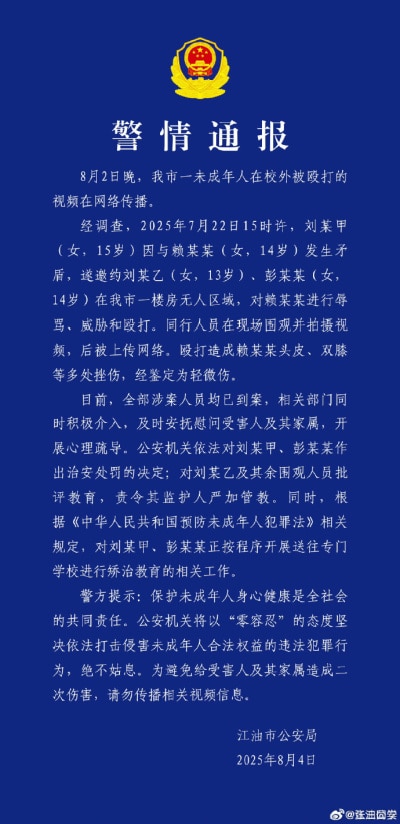
Police report by Jiangyou Public Security Bureau, confirming the details of the incident and the (legal) consequences for the attackers.
Two of the girls (the 15- and 14-year-old) were given administrative penalties and will be sent to a specialized correctional school. The younger Liu and other bystanders were formally reprimanded.
“Parents Speak Out for the Bullied Girl”
The way the incident was handled—not just the relatively late official report, but mostly the perceived lenient punishment—triggered anger online.
Many people who had seen the video responded emotionally and felt that the underage girls should be stripped of their rights to take their exams, and that the bullying incident should forever haunt them in the same way it will undoubtedly haunt their victim.
Especially the phrase “It’s not like I haven’t been taken in [to jail] before” struck a chord, as it showed just how calculated the bullies were—and how, by counting on the leniency of the Chinese judicial system for minors, they made the system complicit in their determination to turn those hours into a living hell for Lai.
China has been dealing with an epidemic of school violence for years. In 2016, Chinese netizens were already urging authorities to address the problem of extreme bullying in schools, partly because minors under the age of 16 rarely face criminal punishment for their actions.
Since 2021, children between the ages of 12 and 14 can be held criminally responsible for extreme and cruel cases resulting in death or disability—but their legal prosecution must first be approved by the Supreme People’s Procuratorate (SPP).
It has not done much to stop the violence.
Discussions around extreme bullying like this have repeatedly flared up over the years, such as in 2020, when a 15-year-old schoolboy named Yuan (袁) in Shaanxi was fatally beaten and buried by a group of minors.
Last year, a young boy named Wang Ziyao (王子耀) was killed by three classmates after suffering years of bullying. His body was found in a greenhouse just 100 meters from the home of one of the suspects, and the case shocked and enraged local residents.
But the problem is widespread among girls, too.
In 2016, we already reported on how so-called ‘campus violence videos’ (校园暴力视频) had become a concerning trend. In these kinds of videos—often showing multiple bullies beating up a single victim on camera—it’s not uncommon to see girls as the aggressors.
Girls often form cliques to gang up on a victim to show that they are in control or to gain popularity. They also tend to be more inclined than boys to make cruel jokes or stage pranks meant to embarrass or humiliate their target. This may partly explain why there seem to be more campus violence videos on Chinese social media showing girls bullying girls than boys bullying boys.
In the case of Lai, she appears to have been particularly vulnerable. One of her relatives posted online that her mother is deaf and mute, and her father allegedly is disabled. This fact may have contributed to why Lai was repeatedly targeted and bullied by the same group of girls, who reportedly took away her phone and socially isolated her at school.
In response to the incident, netizens started posting the hashtag “Parents Speak Up for the Bullied Girl” (“#家长们为被霸凌女孩发声#), not only to support Lai and her family, but to demand harsher punishments for school bullies and for stricter crackdown on this nationwide problem.
From Online Anger to Offline Protest
While many people spoke out for Lai online, hundreds also wanted to show up for her in person.
On August 4, dozens of people gathered in front of the Jiangyou Municipal Government building (江油市人民政府) to demand justice and support Lai’s parents, who had come to express their grievances to the authorities—at one point even bowing to the ground in a plea for justice to be served for their daughter.

Footage and images circulating on social media showing the parents of Lai, the victim, bowing on the ground to demand justice from authorities.
As the crowd grew larger, tensions escalated, eventually leading to clashes between protesters and police.
The arrests at the scene did little to ease the situation. As night fell, the mood grew increasingly grim, and some protesters began throwing objects at the police.
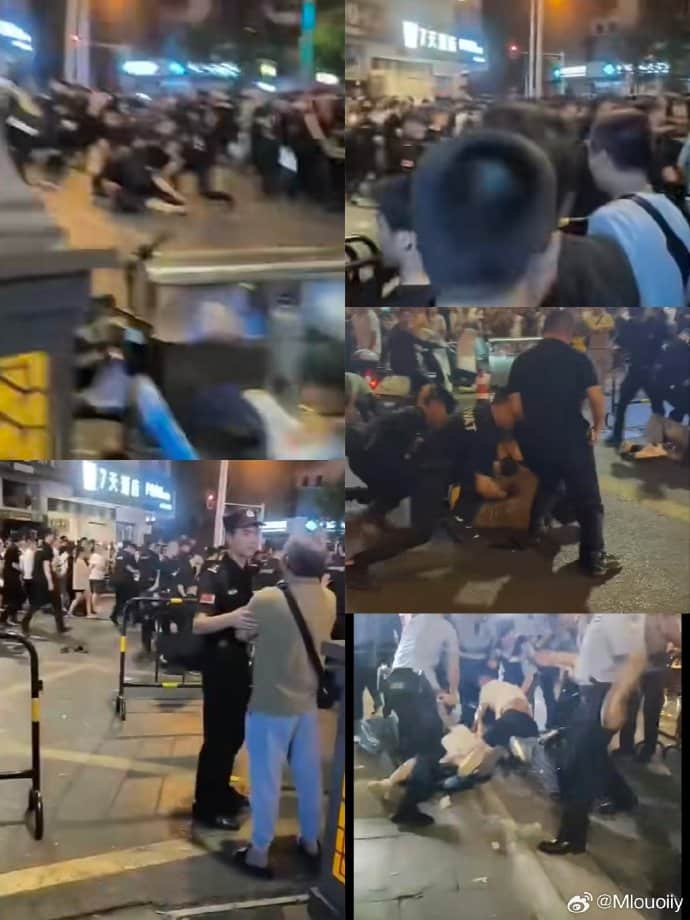
Images of the protest, posted on Weibo.
Near the east section of Shixian Road (诗仙路东段), more people gathered. Hundreds of individuals filming and livestreaming captured footage of the police crackdown—officers beating protesters, dragging them away, and deploying pepper spray.

Netizens’ digital artwork about the bullying incident, the parents’ grievances, and the public protest and its crackdown in Jiangyou. Shared by 程Clarence.
Although the protests briefly gained traction on social media and became a trending topic on Weibo, the search term was soon removed from the platform’s trending list.
Lasting Mental Scars
On Tuesday, August 5, several topics related to the Jiangyou bullying incident began trending again on Chinese social media.
On the short video app Kuaishou, a collective demand for justice surged to the number one spot, under the tag “A large number of Jiangyou parents demand justice for the victim” (江油大批家长为受害学生讨公道).
As of now, none of the perpetrators’ families have come forward to apologize.
As for Lai—according to the latest reports, she did not suffer serious physical injuries from the bullying incident, but according to her own parents, the mental scars will last. She will need continued mental health support and counseling going forward.
Although many posts about the incident and the ensuing protests have been taken offline, ‘Jiangyou’s Bullying Incident’ has already become one more case in the growing list of brutal school bullying incidents that have surfaced on Chinese social media in recent years. The heat of local anger may fade over time, but the rising number of such cases continues to fuel public frustration nationwide—especially if local authorities fail to do more to address and prevent school bullying.
“Not being able to protect our children, that’s a disgrace to our schools and the police,” one commenter wrote: “I want to thank all those mothers who have raised their voices for the bullied child. Each of us must say no to bullies, and we must do all we can to stop them. I hope the lawmakers agree.”
By Manya Koetse
(follow on X, LinkedIn, or Instagram)
Spotted a mistake or want to add something? Please let us know in comments below or email us. First-time commenters, please be patient – we will have to manually approve your comment before it appears.
©2025 Whatsonweibo. All rights reserved. Do not reproduce our content without permission – you can contact us at info@whatsonweibo.com.
China Insight
The Secret Life of Monks: Shi Yongxin’s Shaolin Scandal Casts a Shadow on Monastic Integrity
“To put it bluntly, temples have been places of deception, corruption, opportunism, and exploitation since ancient times.”
Published
3 months agoon
July 28, 2025
This week, news about a well-known Chinese monk going off the Buddhist path has triggered many discussions on Chinese social media.
The story revolves around Shi Yongxin (释永信), the head monk at China’s famous Shaolin Temple (少林寺) in Dengfeng, Henan. Shi is suspected of embezzlement of temple funds and illicit relationships, and is currently under investigation.
In recent days, wild rumors have been circulating online claiming that Shi fled to the United States after being exposed. On July 26, a supposed “police bulletin” began circulating, alleging that Shi Yongxin had attempted to leave the country with seven lovers, 21 children, and six temple staff. It also claimed he was stopped by authorities before exiting China, that he had secretly obtained U.S. citizenship a decade ago, and that he had misused donations and assumed fake identities.
Although that specific report has since been refuted by Chinese official media, it quickly became clear that there was real fire behind all that smoke.

The report that circulated online and was later confirmed to be fake
Because despite all the sensationalized gossip (some posts even claimed Shi had 174 illegitimate children!), what’s certain is that Shi Yongxin seriously crossed the line. On July 27, 2025, the Shaolin Temple Management Office (少林寺管理处) issued an official statement through its verified channels, including its WeChat account. The statement read:
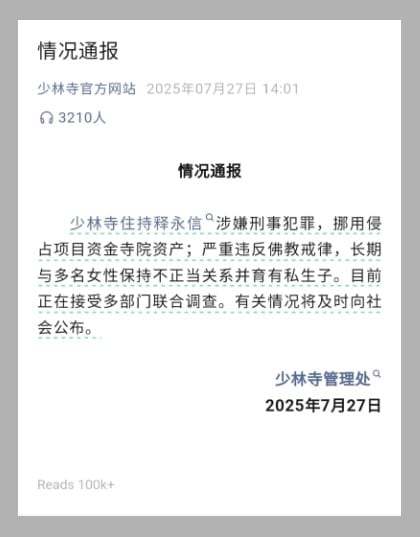
The report that circulated online and was later confirmed to be fake.
Shi Yongxin, the Abbot of Shaolin Temple, is suspected of criminal offenses, including misappropriating and taking project funds and temple assets. He seriously violated Buddhist discipline, maintained improper relationships with multiple women over a long period and fathered illegitimate children. He is currently under joint investigation by multiple departments. Relevant information will be made public in due course.
Shaolin Temple Management Office
July 27, 2025
China’s Buddhist Association (中国佛教协会) also released a statement on July 28, in which it stated that, in coordination with the Henan Provincial Buddhist Association (河南省佛教协会), Shi Yongxin has been officially stripped of his monastic status.
Various Chinese media sources report that Shi Yongxin was taken away by police on Friday, July 25. Chinese media outlet Caixin suggests that it must not have come as a complete surprise, since Shi had allegedly already been restricted from leaving the country since around the Spring Festival period (late January 2025) (#释永信春节前后已被限制出境#).
About Shi Yongxin
Shi Yongxin is not just any abbot. He’s the abbot of the Shaolin Monastery (少林寺), which is one of the most famous Buddhist temples in the world and is known as the birthplace of Shaolin Kung Fu. The temple was founded in 495 CE. Besides being a Buddhist monastery, it also operates as a popular tourist attraction, a kung fu school, and a cultural brand.
Shi has been running the monastery for 38 years, a fact that also went trending on Weibo these days (#释永信已全面主持少林寺38年#, 140 million views by Monday).
Shi Yongxin is the monastic name of Liu Yingcheng (刘应成), born in Yinshang county in Fuyang, Anhui, in 1965. He came to Shaolin Temple in 1981 and became a disciple of abbot Shi Xingzheng (释行正), who passed away in 1987. Shi Yongxin then followed in his footsteps and managed the temple affairs. He formally became head monk in 1999.
Moreover, Shi Yongxin reportedly served as President of the Henan Provincial Buddhist Association since 1998 and as Vice President of the Buddhist Association of China since 2002.

Shi Yongxin, photos via Weibo.
Shi Yongxin was thus an incredibly powerful figure—not only because of the decades he spent overseeing temple affairs, but also due to his influence within public, institutional, and religious spheres.
Holding such a visible role, Shi Yongxin (释永信) also had (or has—though it’s unlikely he’ll ever post again) a Weibo account with over 882,000 followers (@释永信师父). His last post, made on July 24, was a Buddhist text about the ‘Pure Land’ (净土)—a realm said to make the path toward enlightenment easier.
That post has since attracted hundreds of replies. While some devoted followers express disbelief over the scandal, many others respond with cynicism, questioning whether anything about Buddhism remains truly ‘pure.’
One widely shared post shows an artist sitting in front of a painting of Shi Yongxin, writing, “Worked on this painting for six months, just finished late last night—feels like the sky’s collapsed.” The second picture, posted by someone else, says, “Just change it a bit.”

One aspect of the scandal fueling online discussions is the fact that Shi Yongxin had led the monastery for so long. Rumors about his “chaotic private life” and unethical behavior surfaced years ago, going back to at least 2015 (#释永信10年前就曾被举报私生活混乱#; #释永信曾被举报向弟子索要供养钱#). One of the questions now echoing across social media is: why wasn’t he held accountable sooner? “Who was protecting him?”
“The Tip of the Iceberg”
The Shi Yongxin scandal does not just hurt the reputation and cultural brand of the Shaolin Monastery; it also damages a certain image of Buddhist monks as a collective of people with true faith and integrity.
According to well-known knowledge blogger Pingyuan Gongzi Zhao Sheng (@平原公子赵胜), many people’s understanding of abbots or Buddhist masters (“方丈大师们”) is flawed, since it’s generally believed they attained their high positions within the monasteries due to their moral virtue or deep understanding of Buddhism. In reality, Zhao Sheng argues, these individuals often rise to power because they are skilled at earning money and gaining influence.
“To put it bluntly,” Zhao Sheng writes, “temples have been places of deception, corruption, opportunism, and exploitation since ancient times.”
The blogger argues that much of the influence and power of Buddhist masters was stripped away under Mao Zedong, but that some new famous monks rose in the 1980s, using their skills and connections to rebuild temples and turn them into thriving enterprises.
“If you want to find a few people in temples who truly have faith, who truly have personal integrity, and who are truly dedicated to saving all living things, it’s not that they don’t exist—but it’s rather difficult, like finding a needle in a haystack,” Zhao Sheng wrote.
Some commenters suggest that Shi Yongxin is just the tip of the iceberg (“冰山一角”). They believe that if someone as influential as him can be involved in such misconduct—despite whistleblowers having tried to expose him for over a decade—there must be many more cases of power abuse and corruption within China’s monasteries.
“I previously donated money to the temple,” one commenter on Xiaohongshu wrote: “Although it wasn’t much, it does make me a bit uncomfortable now.”
Another person posted that the Shi Yongxin scandal gave them a sense of despair.
Some older posts about the extravagant lifestyles of head monks — including their luxury cars — have also resurfaced online and are once again making the rounds, suggesting that netizens are actively revisiting other potential instances of misconduct within the monastic world.

Abbot Guangquan Fashi (光泉法师) with a Ferrari California T, Kaihao Fashi (开豪法师) with a Porsche Panamera, Shi Yongxin (释永信) linked to an Audi Q7, and Huiqing (慧庆) and a BMW 7 Series.
One image that resurfaced online shows Shi Yongxin—allegedly driving an Audi Q7—alongside other abbots, such as Guangquan Fashi (光泉法师), the head monk of Lingyin Temple (灵隐寺), who is associated with a Ferrari.
More images like these are now circulating, as people delve into the ‘secret lives of monks’ beyond the spiritual, shifting focus to their material lives instead.

Monks from major temples, including Qin Shangshi (钦尚师) of Famen Temple, E’erdeni (鄂尔德尼) of Jokhang Temple in Lhasa, Yin Le (印乐) of Baima Temple, and Huiqing (慧庆) of Baishou Temple, are rumored to be associated with high-end cars like BMWs, a Porsche Cayenne, and a Range Rover.
While the results of the investigation into Shi Yongxin are still pending, many netizens are already looking beyond him. One person writes: “Are you realizing now? It’s not just Shaolin Temple that has money, other temples aren’t exactly short on money either.”
Another person wonders: “Are the monks in today’s temples actually still truly devoted to spiritual practice at all?”
By Manya Koetse
(follow on X, LinkedIn, or Instagram)
Spotted a mistake or want to add something? Please let us know in comments below or email us. First-time commenters, please be patient – we will have to manually approve your comment before it appears.
©2025 Whatsonweibo. All rights reserved. Do not reproduce our content without permission – you can contact us at info@whatsonweibo.com.
Subscribe
What’s on Weibo is a reader-supported publication, run by Manya Koetse (@manyapan), offering independent analysis of social trends in China for over a decade. To receive new posts and support our work, consider becoming a paid subscriber.

Get in touch
Would you like to become a contributor, or do you have any tips or suggestions? Get in touch here!

House of Wahaha: Zong Fuli Resigns

How the “Nexperia Incident” Became a Mirror of China–Europe Tensions

China Faces Unprecedented Donkey Shortage Crisis

Nanchang Crowd Confuses Fan for Knife — Man Kicked Down and Taken Away

The Wong Kar-wai Scandal Explained: The Dark Side of ‘Blossoms Shanghai’

Hidden Cameras and Taboo Topics: The Many Layers of the “Nanjing Sister Hong” Scandal

“Jiangyou Bullying Incident”: From Online Outrage to Offline Protest

The Rising Online Movement for Smoke-Free Public Spaces in China

China Trend Watch: Pagoda Fruit Backlash, Tiananmen Parade Drill & Alipay Outage (Aug 11–12)

From Schadenfreude to Sympathy: Chinese Online Reactions to Charlie Kirk Shooting
Popular Reads
-

 China Memes & Viral3 months ago
China Memes & Viral3 months agoHidden Cameras and Taboo Topics: The Many Layers of the “Nanjing Sister Hong” Scandal
-

 China Books & Literature12 months ago
China Books & Literature12 months agoThe Price of Writing Smut: Inside China’s Crackdown on Erotic Fiction
-

 China Insight5 months ago
China Insight5 months agoUnderstanding the Dr. Xiao Medical Scandal
-

 China Memes & Viral10 months ago
China Memes & Viral10 months agoOur Picks: Top 10 Chinese Buzzwords and Phrases of 2024 Explained


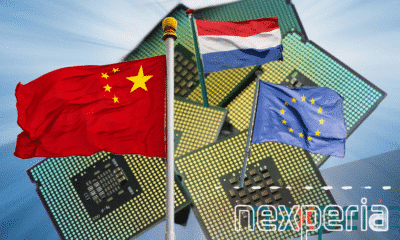
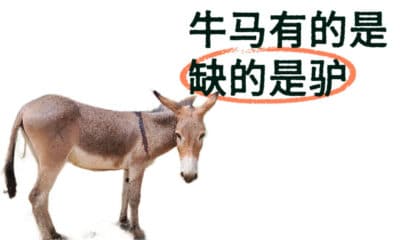
Emilio
July 17, 2020 at 5:07 pm
The implementation of this law is a clear advance in terms of security for Hong Kong
freerobuxnoverification
July 30, 2021 at 10:53 pm
Yes its true Hong Kong security is a hot topic in international media and you shared a very good topic here. Thank you